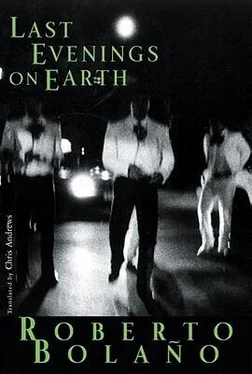For the writers, however, Leprince is something of an enigma and a surprise. Those who enjoyed a certain notoriety before the capitulation and never deigned to notice Leprince find themselves running into him everywhere they go, and worse, having to depend on him for protection and safe passage. Leprince seems to have emerged from limbo; he helps them, puts the meager sum of his possessions at their disposal; he is cooperative and diligent. The writers talk to him. The conversations take place at night, in dark rooms or corridors, and are always conducted in whispers. One writer suggests he try his hand at composing stories, verse, or essays. Leprince assures him that he has been doing precisely that since 1933. The nights of waiting are long and anxious, and some of the writers are talkative; they ask where he has published his works. Leprince mentions mouldering magazines and newspapers whose mere names provoke nausea or sadness. These conversations generally end at daybreak: Leprince leaves his charge in a safe house, with a hearty handshake or a brisk hug followed by a few words of thanks. And the words are sincere, but once the episode is over the writers avoid Leprince, and he fades from their minds like an unpleasant but forgettable dream.
There is something elusive, something indefinable about him that people find repellent. They know he is there to help, but deep down they simply cannot warm to him. Perhaps they sense that Leprince is tainted by the years he has spent in the underworld of sad magazines and the gutter press, from which no man or beast escapes, except the exceedingly strong, brilliant, and bestial.
Needless to say, Leprince has none of these qualities. He is not a fascist, or a card-carrying Party member, nor does he belong to any society of authors. The authors with whom he is in contact regard him, perhaps, as a paradoxical parvenu or reverse opportunist (since for him the obvious thing would be to denounce and insult them, to help the police in their interrogations and devote himself heart and soul to the collaborationist cause) who, in one of those fits of madness to which the literary journalist is prone, happened to choose the right side, as unconsciously as bacteria infect a host.
The flamboyant novelist from Languedoc, Monsieur D., for example, notes in his diary that Leprince reminds him of a Chinese shadow puppet, but does not elaborate. The others ignore him, with one or two exceptions; there is the odd mention of Leprince the man, but nothing about his writing. Nobody can be bothered to look up the works of the writer who saved their life.
Utterly detached, Leprince goes on working at the newspaper office (where he is regarded with increasing suspicion) and drafting poems. The daily risks he runs are considerably superior to the minimum required for the preservation of self-respect. He is often courageous to the point of recklessness. One night he shelters a surrealist poet hunted by the Gestapo, who is destined to end his days (through no fault of Leprince's) in a German concentration camp. The poet leaves without a word of thanks; for him, Leprince is simply a comrade doing what he himself would do in the same situation, not a colleague (to use that appalling term) or a fellow member of his demanding profession. One weekend Leprince escorts a critic to a village near the Spanish border. The critic once poured scorn (perhaps with good reason) on a book penned by his guide, a book which, at this crucial moment, he has completely forgotten, so negligible, so insubstantial is Leprince's work and public stature.
Sometimes Leprince suspects that his face, his education, his attitude, or the books he has read are to blame for this rejection. Between newspaper articles and clandestine missions, he throws himself into the composition of a long poem: more than 600 lines exploring the mystery and the martyrdom of minor poets. When the poem is finished, after three months of strenuous and painful effort, he realizes, to his astonishment, that he is not a minor poet. Any other writer would have pursued his investigations, but Leprince is devoid of curiosity about himself. He burns the poem.
In April 1943, he loses his job. In the months that follow he lives from hand to mouth, on the run, pursued by the police, informers, and destitution. One night, as chance would have it, he is sheltered by a young lady novelist. Leprince is anxious and the novelist is an insomniac, so they stay up talking for hours.
That night, deep inside Leprince, a mechanism is released; he openly confesses all his frustrations, all his dreams and ambitions. The young novelist, who frequents literary circles as only a French woman can, recognizes Leprince or thinks she does. Over the previous months she has seen him on hundreds of occasions, always in the shadow of some famous writer wanted by the authorities, or waiting outside the room of a playwright involved in the Resistance, always in the role of messenger, secretary, or valet. You were the only one I didn't know, says the young novelist, and I kept wondering what you were doing there. You were like the invisible man, she adds, always waiting silently, ready to help.
Encouraged by the young woman's frankness, he opens his heart. He talks about his work and she is monumentally surprised. Naturally, they broach the subject of Leprince's obscurity. After some hours of conversation, the young woman believes that she has identified the problem and its solution. She speaks bluntly: there is something in him, she says, something in his face, his way of speaking, his gaze, that most people find repellent. The solution is obvious: he has to disappear, go undercover, he must try not to let his face show in his writing. The solution is so childishly simple, it is bound to work. Leprince listens in amazement and agrees. He knows he is not going to follow the young novelist's advice; he feels surprised and perhaps slightly offended, but he also knows it is the first time that someone has listened to him and understood him.
The following morning a Resistance car comes to pick him up. Before he leaves, the young novelist shakes his hand and wishes him luck. Then she kisses him on the lips and starts to cry. Leprince doesn't understand what is happening.
Confused, he mumbles a few words of thanks and walks away. The novelist watches him from the window: Leprince gets into the car without looking back. She spends the rest of that morning thinking of him (as Leprince will somehow sense or dream, perhaps in a passage of his uneven work), fantasizing about him, telling herself she is in love with him, until weariness finally overcomes her and she falls asleep on the sofa.
They will never see each other again.
Modest and repellent, Leprince survives the war, and in 1946 retires to a small village in Picardy where he takes a job as a teacher. His contributions to the press and certain literary magazines are regular if not numerous. In his heart, Leprince has finally accepted his lot as a bad writer, but he has also come to understand and accept that good writers need bad writers if only to serve as readers and stewards. He also knows that by saving (or helping) several good writers he has earned the right to sully clean sheets of paper and make mistakes. He has also earned the right to publish in two or maybe three magazines. At some point, of course, he tries to locate the young novelist, to find out about her. But when he goes back to her house, other people are living there and nobody knows where she has gone. Leprince, of course, searches for her, but that is another story. In any case he never sees her again.
He does, however, see the Parisian writers. Not as often as he would really like to, but he sees them, and talks to them, and they know who he is (vaguely in most cases); there are even one or two who have read a couple of his prose poems. For some, his presence, his fragility, his terrifying sovereignty serve as a spur or reminder.
Читать дальше












